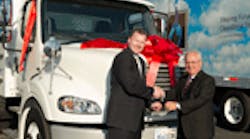See a photo gallery from the event
ANAHEIM. Executives from Daimler Trucks North America (DTNA), Ryder System, Inc., and Cummins Westport, along with elected officials and DTNA customers gathered on Monday afternoon at Angel Stadium to officially present the keys to DTNA’s 1000th natural gas truck to Ryder. As the ceremonial red ribbon slipped off the hood of the white Freightliner M2 112 compressed natural gas (CNG) tractor with a Cummins Westport ISL G engine, the audience applauded the clean energy milestone.
“We have enjoyed a tremendous relationship with Cummins Westport,” observed Bob Carrick, vocational sales manager, natural gas Freightliner trucks for Daimler Trucks North America. “We would not be here today without them. The ISL G was the first engine made specifically to run on natural gas. Every natural gas truck out there is saving, on average, about 500 barrels of oil a year.”
The mayor of Santa Ana, Miguel Pulido, was also on hand to congratulate DTNA, Cummins and Ryder for their contributions to cleaner air. “Today, we are making a difference,” he said. “[With natural gas vehicles], companies can save money on fuel, clean up the air and help to realize energy independence all at the same time. I think the market is ready.
“Here in Southern California where I grew up, it used to be that we could not play outside some days because the air quality was so bad,” he recalled. “Instead, we had to stay in the classroom with our heads down on our desks. [Believe me,] we are behind the DTNA team 100%.”
Scott Perry, vice president supply management for Ryder Fleet Management Solutions, accepted the truck on behalf of Ryder, thanking DTNA; Cummins; California’s South Coast Air Quality Management District; Gladstein, Neandross and Assoc. and others for their efforts.
“We hope to replicate what we are doing here [in Southern California] in other metropolitan markets,” he said. “In fact, we are already beginning. We are also deploying natural gas vehicles in the Detroit area in Michigan and in Tucson, AZ.”
Ryder has taken a three-pronged approach to natural gas vehicles in California, Perry noted, where the company has deployed 202 trucks, installed two natural gas fueling stations and opened three roadside service and maintenance facilities. “One hundred and eighty-two of those 202 trucks are Freightliner M2s,” he said.
The company plans to continue expanding its natural gas fleet in California, as well, Perry added. “We intend to deploy more natural gas trucks in California, including medium-duty and light duty,” he said. Like other natural gas proponents, Perry had high praise for the benefits of natural gas as a vehicle fuel tempered by a realistic assessment of the challenges still ahead. On the benefits side of the ledger, he noted that natural gas is a cleaner fuel, is domestically available and significantly lower in cost than diesel. Natural gas trucks are also quieter to operate, create no diesel exhaust odor and may reduce the complexity of emissions control systems for carriers.
When it comes to limitations, the number-one item on Perry’s list (and virtually everyone else’s for that matter) is the lack of a robust fueling infrastructure. Vehicle investment premiums, the currently limited engine portfolio, still unknown operating costs and residuals and the high cost of developing maintenance facilities ($350,000 to $500,000) are other challenges, he noted.
In spite of these obstacles, DTNA and its partners and customers remain bullish about the future for natural-gas fueled trucks, and the company gave attendees a preview of that future during the event - a Freightliner Cascadia equipped with a new, more powerful natural gas engine from Cummins Westport that can operate on CNG or LNG (liquid natural gas). Under development now, the new engine, dubbed the ISX, is intended to handle “true 80,000-lb. applications,” according to Carrick.
“I tell people, if you want to go faster, climb higher and haul heavier,” this will be the natural gas engine for you,” he told Fleet Owner. “This is the game changer. When the fueling infrastructure catches up with us, this engine will enable fleets to use natural gas in long-haul applications.”
DTNA trucks equipped with ISX engines are expected to be available in the spring or summer of 2013. The CNG-powered truck that was on display (and will be delivered to Wal-Mart) is one of about twenty such test units, running in seven different states. One test unit has already logged more than 60,000 on-highway miles, Carrick noted.
According to Gord Excel of Cummins, the new engine has not yet been rated for horsepower. “However, this will fill a gap in the natural gas engine market for sure,” he told Fleet Owner. “We expect it to fill the same niche as twelve- to thirteen-liter diesel engines.”



